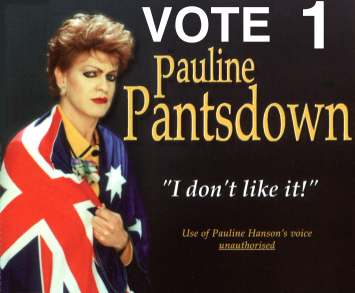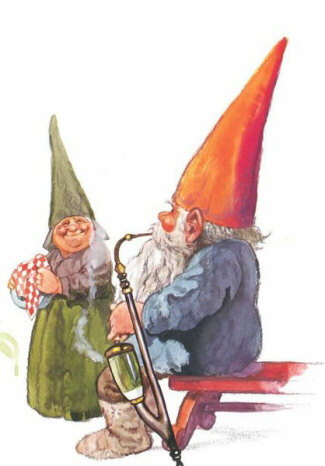 June 06
June 06
Voting Kinky: The Politics of Ridicule
by Sarah Lefton
p. 2 of 2
The "Backdoor Man": Pauline Pantsdown
 Simon Hunt is a media critic and faculty member at the University of New South Wales, Australia. He's also a gay man and a music producer. When Pauline Hanson and her One Nation party launched a racist campaign for parliament devoted to stopping Asian immigration, denying rights to aboriginals, subsidizing medical care for whites and ceasing foreign aid, Hunt was inflamed. He did what he knew best– used some a PC to cut together a satirical song called "I'm a Backdoor Man." The highly danceable track was a cut-up of samples of Pauline Hanson's voice, and put back together in a way that mocked her agenda. Hunt released it under a drag pseudonym, Pauline Pantsdown.
Simon Hunt is a media critic and faculty member at the University of New South Wales, Australia. He's also a gay man and a music producer. When Pauline Hanson and her One Nation party launched a racist campaign for parliament devoted to stopping Asian immigration, denying rights to aboriginals, subsidizing medical care for whites and ceasing foreign aid, Hunt was inflamed. He did what he knew best– used some a PC to cut together a satirical song called "I'm a Backdoor Man." The highly danceable track was a cut-up of samples of Pauline Hanson's voice, and put back together in a way that mocked her agenda. Hunt released it under a drag pseudonym, Pauline Pantsdown.
I'm very proud
that I'm not straight
I'm very proud
that I'm not natural
I'm a backdoor man
for the Ku Klux Klan
with very horrendous plans
Using "Sending You Forget-me-nots" as backup, the bouncy beat and hilarious lyrics helped it leap out of the gay underground and onto national radio, where it caused a sensation in heavy rotation. Though musically and technically inferior to today's mash-ups, it caught on hard and fast. Pantsdown quickly became an object of major media attention, and something to which the Hanson campaign was forced to respond. Unfortunately, the Hanson campaign sued the national radio station for defamation. This had a chilling effect on radio stations, which were unwilling to take the risk of playing the song any longer.
Hunt was inspired. He officially changed his name to Pauline Pantsdown and entered the race for Parliament, declaring that there would "either be two Paulines, or none." She followed Hanson around the campaign trail, dressed identically to her in tacky red dresses, perfectly lopsided makeup and a tousled frosted hairdo. She released two more songs mocking Hanson, one of which ("I Don't Like it") received enormous airplay, received two ARIA (Australian Grammy) nominations and became an activist rallying cry.
1-2-3-4-5-6-7-8, racist rubbish, racist hate,
1-2-3-4-5-6-7-8, racist rubbish, racist, feel the heat.
I don't like it, when railway lines are white,
I don't like it, when day becomes night.
The strategically important part about Pantsdown’s campaign was the way her music and theatrical seizure of media attention forced Pauline Hanson to acknowledge the critique of her campaign. Wherever she went, Pantsdown followed, and the camera crews were so amused by the evil twin that Hanson had to respond. Although Pantsdown's third song bombed, receiving very little attention, the overall effort was a success, as Hanson was humiliated and went on to lose her campaign.
A key to Pantsdown's success was her status as an island. She was not the front for an existing movement or organization, and she answered to no one for her actions. Her campaign was, to Bogad, Brechtian: "alienating and calling into question many assumptions about Hanson's persona and party, rather than … [an] interactive, creative mass dynamic."
"An extended bit of satire and provocation, not an earnest negotiation with the extant political system": The Kabouters
But what happens when a drag candidate really wins?
 Bogad's book takes a look at 1970s Amsterdam, where the absurdist, anarchist Kabouter Party actually won five seats on City Council. A kabouter is a gnome in Dutch folklore – think of those adorable little yard gnomes, the enchanting Gnomes and Trolls TV specials, and the books about magic still popular with gardeners and kids. The Kabouter party was a group of anarchists and artists who in the late 1960s took up the kabouter as a sweetly populist symbol of all that could go right in local politics were it not for the heartless regime.
Bogad's book takes a look at 1970s Amsterdam, where the absurdist, anarchist Kabouter Party actually won five seats on City Council. A kabouter is a gnome in Dutch folklore – think of those adorable little yard gnomes, the enchanting Gnomes and Trolls TV specials, and the books about magic still popular with gardeners and kids. The Kabouter party was a group of anarchists and artists who in the late 1960s took up the kabouter as a sweetly populist symbol of all that could go right in local politics were it not for the heartless regime.
The Kabouters used humor and pranks to expose the brutality of Amsterdam police, the city's dire housing shortage, and the City Council as stodgy and uncreative. Bogad goes into fascinating detail about some of these pranks, which have so obviously inspired the street performers and activists of today's New York, San Francisco, Berlin and London that it's incredible so few people know their history:
Operation Wandering Branch was an ongoing Kabouter action in which Kabouters ripped up street pavements and planted trees in the middle of urban spaces…This led to the police arresting the nonviolent activists and their illegal trees. Naturally the police looked a bit silly ripping up the trees and taking them away in police wagons, and attention was called to the lack of green spaces in the city…the Kabouters highlighted a serious urban political issue through provocative and humorous action rather than speechifying.
These were serious pranksters, and sooner or later they realized that a natural escalation of their politics and their theatrical style entailed actually running for city office.
Astonishingly, the Kabouters and their farcical Orange Free State platform (predicated on "Sweetness, flowers and understanding") won 11% of votes cast in the Amsterdam City Council elections, making them the fourth largest party and entitling them to five seats on the Council. They were bigger than the Socialists, Leftists, Far Rightists, and dead even with the Catholic party. Pixie Power overtook voters, and the Kabouters found themselves with a conundrum: who would actually serve, and how?
Five activists took up the call to power gleefully, reading folktales about homelessness into the public record, smoking hash in session and using the roll call to condemn the corrupt Indonesian dictator Suharto. They masterfully used the formality of the status quo to call attention to housing shortages, drug legalization, racism and poverty. Working in accordance to the anarchist ethic, "nobody can represent someone else, they decided that power would rotate every year, so that no one kabouter would become too power-drunk or unresponsive to the movement at large.
Unfortunately, despite all the right precautions, the movement ultimately collapsed. To the chagrin of the gnomes-on-the-street, the council members actually took themselves seriously. After all, how much counterculture can you retain when you've got power? A schism occurred between what Bogad terms the "strategic anarchists" (cautious, intellectual organizers) and the "ludic strategists" (absurdist orchestrators of street theatrics.) Was civic power a way to promote anarchism, or was this an opportunity to build another political party (albeit a funnier one)? Bogad again:
Symbols and symbolic action are multivalent and open to active interpretation,
leading to conflict not only between the "straights" and the "hip," but among
diverse hipsters as well. The Orange Free State was an ironic construction…
its members accomplished a great deal with few resources and their enormous
creative energy. But as some Kabouters began to take [it] as a serious player
in the electoral sphere, they became ripe for attack from their colleagues who
still saw it solely as a clever, anarchist, anti-state joke…When Kabouters started
denouncing each other, their human identity was revealed, the ludic, fantastic
symbol-structure was undermined, and the activist rank-and-file left the fairy
tale forests for the more prosaic, tangible grassroots.
Significantly for the activist reader, Bogad leaves us with a hard look at how satire, "like any other tactic, can get old and boring with repeated use." While we probably shouldn't expect to find far right politicians getting into drag to humiliate their opponents, we can’t bet on the left owning parody either. Sooner of later, the press tires of pranks, and so does the public. Additionally, Bogad warns that pushing pranks too far into the mainstream can alienate the grassroots that launch movements.
The more involved that the Kabouters got in City Council, and the more they pushed their agendas onto the national stage, the more isolated average gnomes on the street felt. They lost interest in the movement and it became harder to find activists willing to serve in official capacity. The movement splintered into smaller groups of civic activists. The lasting good news was that these activists had tools and experiences that made their projects more effective. As a result, the Amsterdam City Council, to this day, works differently because of some of the provocative actions that Kabouters took from their seats.

Elections are a Joke
Do those engage in electoral guerilla theater really have action plans for changing society? After reading Bogad's book, you would perhaps conclude no. The three profiled candidates certainly had sharp critiques of the status quo, and they certainly knew where the points of pain were to be found, yet when given actual opportunities to lead, these movements collapsed (as would a ficus, no doubt, should it actually win the American presidency.) Pauline Pantsdown's campaign arguably brought the greatest return on investment of the three, precisely because her goals were narrow and explicit – to expose Hanson as a racist and ruin her chances for office. Perhaps electoral guerilla theater is best used as a subversive sort of counter-PR tool, and best exercised by professional media hackers like Simon Hunt.
Yet the underlying message of electoral satire is more subversive than that: that elections themselves are a form of performance, and that the real political issues of the day are unlikely to be addressed in sound-bites and focus-group-tested advertisements. As Joan JettBlakk said, "Elections are a joke. We're making this one a good joke."
So what can we expect from our Kinky Friedman? Sure, he's a mensch with a terrific stage presence and a knack for suspenseful prose but can he win the governorship of Texas? His performance to date signifies his potential to make an impact, if not a majority, at the ballot box. It remains to be seen, however, whether the carnival that he's running actually galvanizes the disenfranchised, and alienates voters in just the right way to inspire them to change. What's certain in the meantime is that he's got some damned nice T-shirts for sale, and a great radio promo by Willie Nelson. Plus Texas would be sorry to see him leave for Arizona in the event of a crushing loss - he's entertaining as hell.
Sarah Lefton is the creator of www.jewishfashionconspiracy.com and the engineer of the "Sacramento Girlie-Men" phenomenon a couple of years ago.









